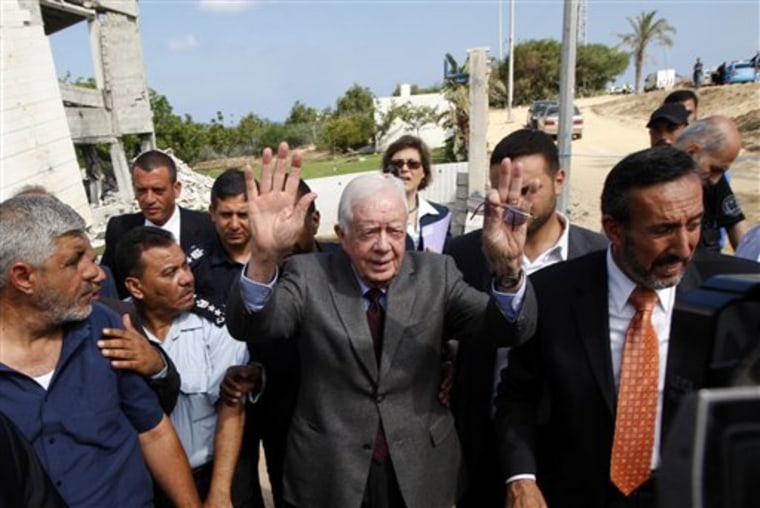Former U.S. President Jimmy Carter criticized Israel's blockade during a trip to Gaza on Tuesday, while encouraging the territory's Hamas rulers to accept international conditions for ending its boycott of the militant Islamic group.
During his visit, Hamas security found what appeared to be explosives buried in a sand dune next to Carter's route. No one was hurt, and it was unclear if the former U.S. president was being targeted.
Speaking at a graduation for students from United Nations-run schools in Gaza City, Carter criticized the Gaza blockade imposed by Israel and Egypt after Hamas took control, saying Gazans "are treated more like animals than human beings."
Carter's one-day Gaza visit came at the end of a swing though Lebanon, Syria and Israel, during which he encouraged officials in all countries to move toward a negotiated end to the Middle East conflict.
Carter — a former U.S. president who helped broker the historic peace treaty between Israel and Egypt — serves a unique, though unofficial, role in peacemaking efforts in the region.
Although traveling as a "private citizen" and not a representative of the U.S. government, Carter said he would report to Obama administration officials after returning to the United States.
Carter has advocated talking to all parties in the conflict, even Hamas, which the United States, the European Union and Israel consider a terrorist organization and do not deal with directly.
Carter said one of his trip's main goals was to persuade Hamas to accept the West's three conditions for engaging the group: renouncing violence, recognizing Israel and accepting previous Israeli-Palestinian agreements — all of which Hamas has refused to do.
At a news conference in Tel Aviv after leaving Gaza, Carter said he was waiting for Hamas to determine what it could agree to.
"When they make their decision on the exact language, they'll be back in touch with me, and I'll relay that commitment to the government officials in my country," Carter said.
While in Gaza, Carter met with civil leaders and toured areas damaged in Israel's three-week offensive against Hamas, which ended Jan. 18.
Standing near the American International School of Gaza — which the Israeli army flattened during the offensive because it said militants launched rockets from nearby — Carter said he found the destruction "distressing."
"I have to hold back tears when I see the deliberate destruction that has been wreaked against your people," he said. Noting that many Israeli weapons are built in and provided by the United States, he added, "I feel partially responsible for this, as must all Americans and all Israelis."
He also called for an end to the rockets attacks on Israel by Gaza militants.
"All this violence must stop in order for me and others to have a chance to help you find peace," he said.
Carter also said he would give Hamas officials a letter to captured Israeli soldier Gilad Schalit from the soldier's parents, whom he met with in Israel.
The soldier was captured by Hamas militants nearly three years ago in a cross-border raid. Two other soldiers were killed.
Abu Obeida, a spokesman for Hamas' military wing, said it would "study the possibility of delivering the letter."
"Everything is subject to evaluation on both a security and decision-making level," he said in a statement.
After leaving Gaza, Carter said he did not believe reports of a bomb plot to kill him while in Gaza.
Following Carter's entry to Gaza, five men, some wearing Hamas police uniforms, removed three large, black disks and some wire from a sand dune next to a road Carter had used.
A uniformed officer at the scene told The Associated Press that the items were explosives, but police spokesman Islam Shahwan later said that an explosives unit had found nothing.
Israeli security officials say soldiers in a lookout post spotted Hamas forces dismantling explosives. They said they passed on a warning to Carter's security detail.
The Israeli officials spoke on condition of anonymity because they were discussing classified information.
